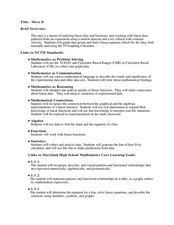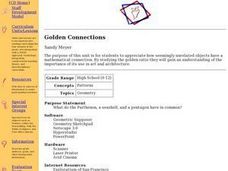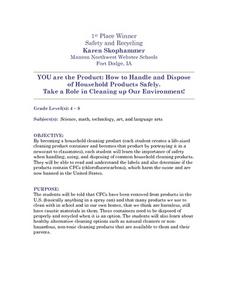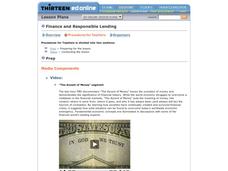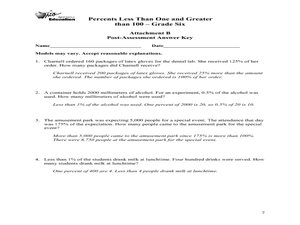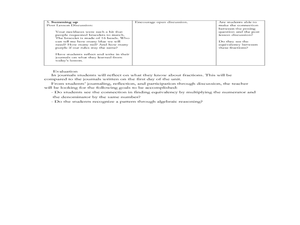Curated OER
Mathematicians are People, Too!
Students access the Internet to locate data regarding their assigned mathematician. They organize their notes on a data form, write a report, create a visual and present their facts to their classmates.
Curated OER
What is Probability?
Learners participate in a variety of activities in order to understand the concept of probability. The students are engaged because of the application of The Multiple Intelligences Theory.
Curated OER
Use Proprotions To Solve Word Problems
Eighth graders explore ratios and proportions and how they are used in day to day life. As an activity, they find their own heart rate and then take a survey of other heart rates in the room. After organizing the data, 8th graders use...
Curated OER
Compatible Numbers To Ten
Young scholars solve both addition and subtraction facts and discover the relationship between adding and subtracting equations. Students read real life word problems, extrapolate needed information, and write equations to solve the...
Curated OER
Variables and Patterns: Determining an appropriate scale while graphing
Sixth graders determine appropriate scales when graphing data. In this graphing lesson, 6th graders use an the applet "Graph It" to determine what is an appropriate scale for their data.
Curated OER
It's Your Future
Students learn about productive resources along with their requirements, supply and demand, savings, investments and interest rates. In this supply and demand instructional activity, students create a career plan and personal budget of...
Curated OER
Statistics and Shopping
Students explore the concept of using consumer data and statistics to aid in the consumer decision making process. In this consumer data and statistics lesson, students research consumer data and statistics. Students analyze the data...
Curated OER
The Mesozoic Era
Sixth graders recognize that the Earth was different in different eras. In this Mesozoic Era activity, 6th graders compare the time frame of the different eras and how long they lasted for by graphing them. Students study the...
Curated OER
Count Down the Days to a Special Event
Young scholars calculate time using a grade appropriate skill. In this time lesson, students calculate the time to a special event. Young scholars calculate days, months, weeks, hours, minutes or seconds depending on their skill level....
Curated OER
A Turkey for Thanksgiving - Lesson #2
Second graders investigate realistic fiction, holiday celebrations, making tally charts. For this multi-disciplinary lesson, 2nd graders listen to a story about Thanksgiving and one about the Chinese New Year to develop an understanding...
Curated OER
Mean, Median, & Mode
Students determine mean, median, and mode. In this problem solving lesson, students evaluate a set of data to determine the mean, median, and mode. Students work in small groups practicing cooperative learning skills as they problem solve.
Curated OER
Move It
Studens collect and graph data. In this algebra lesson plan, students use a CBL and CBR with a TI Calcualtor to observe linear graphs. They use the correct vocabualry as they discuss the collected data.
Curated OER
Wildlife Sampling-Capture-Recapture
Seventh graders simulate the capture-recapture method of population sampling using beans. In this biology lesson, 7th graders calculate the total population of beans in the bowl. They assess whether this method is reliable or not.
Curated OER
The Mandelbrot Set
Students are introduced to the notion of a complex number and function iteration in order to motivate the discussion of Julia sets and the Mandelbrot set.
Curated OER
Golden Connections
Students determine the ratio of pairs of consecutive terms in the Fibonacci Sequence. Using four different colors, they create a golden rectangle in either two or three dimensions. They use photographs to create two collages using...
Curated OER
Gingerbread Houses
Students use their knowledge of fractions and ratios to build gingerbread houses. In this fractions and ratios lesson plan, students use graham crackers, milk cartons, icing, and more.
Curated OER
Will There be Enough Water?
Students investigate water usage, water available, and water demand historically in the local area. They use projections of water usage, availability and demand up to the year 2050. Students use graphs to relate as well as compare and...
Curated OER
How to Handle and Dispose of Household Products Safely
Pupils engage in the study of household cleaning products, how to read the labels and how to use them safely and also how to properly dispose of the containers when they are empty. They read the labels and determine if the products...
Curated OER
Geometry and Quilting
Fourth graders combine geometry and language arts skills while examining quilt-making. After identifying the geometric shapes contained in quilts, they write stories to encompass the quilt border. Students conclude by creating and...
Curated OER
Finance and Responsible Lending
High schoolers learn the characteristics of economic systems through problem solving, communication and representation. In this financial lending lesson, students use math to solve problems dealing with the economy today, to work with...
Curated OER
One is a Snail, Ten is a Crab.
Students count by pairs and sets of feet, while reading a story that coincides with this practice. In this math lesson, students use their skills to count by multiples and adding on to numbers when they add up feet from humans, and...
Curated OER
Percents Less Than One and Greater Than 100
Sixth graders express numbers as percents greater than 100 and less than one. In this lesson on percents, 6th graders work in groups with real life scenarios to develop an understanding on percentages greater than 100 and less than one....
Curated OER
Crafty Fractions
Fourth graders study fractions. In this fractions lesson, 4th graders define fraction-related vocabulary words. Students use beads to study fractions. Students draw shapes to study fraction equivalency and brainstorm fractions they use...
Curated OER
Television: Comedy Vs. Drama
Students investigate the world of Television by contrasting specific programs. In this visual storytelling lesson, students compare and contrast the differences between comedy and drama by making a Venn Diagram. Students utilize the...













